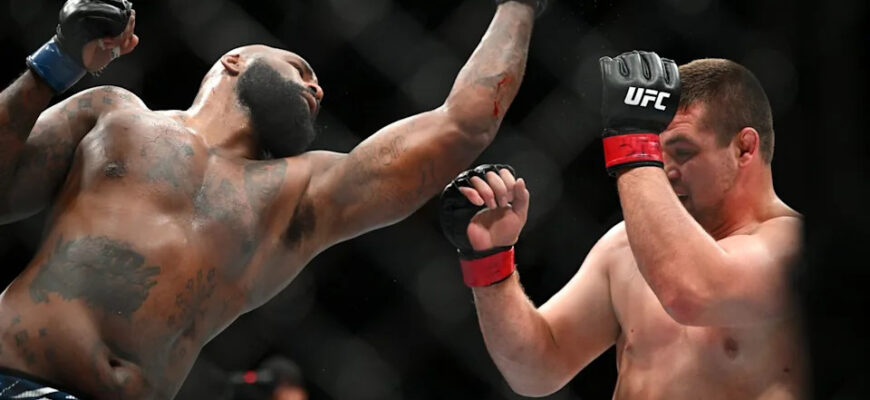In the unpredictable world of mixed martial arts, moments of explosive impact often redefine narratives. Such was the case at UFC Nashville, where Derrick Lewis, affectionately known as “The Black Beast,” delivered a knockout so swift and decisive it left spectators pondering the immediate future of the heavyweight division. His 35-second victory was not just another win; it was a thunderous statement that reverberated through the sport, forcing a re-evaluation of his standing and the chaotic landscape of the UFC`s premier weight class.
The Unstoppable Force: Lewis`s Record-Setting Performance
The main event of UFC Nashville featured Derrick Lewis squaring off against Marcos Rogério de Lima. From the opening bell, Lewis demonstrated the raw, devastating power for which he is renowned. In a mere 35 seconds, he connected with a strike that rendered de Lima unconscious, securing his victory by knockout. This wasn`t merely a win; it was a historical achievement. This lightning-fast finish marked Lewis’s 14th career knockout in the UFC, further solidifying his position as the promotion’s all-time leader in this category. His fighting style, often characterized by unrefined power and surprising resilience, continues to defy conventional expectations, proving that in the heavyweight division, one punch can indeed change everything.
A Division in Flux: The Heavyweight Labyrinth
The heavyweight division currently finds itself in a peculiar state. With Jon Jones, the reigning undisputed champion, sidelined by injury, and Tom Aspinall rising to prominence as the interim champion, the path to the undisputed title is anything but clear. The division, never one for predictable trajectories, now presents a unique conundrum: where does a record-breaking knockout like Lewis`s fit into this intricate puzzle? Does a rapid, dominant victory against a mid-tier contender, especially given Lewis`s recent struggles, suddenly propel him into title contention against Aspinall? The possibility, while seemingly far-fetched by traditional ranking metrics, is not entirely out of character for a division that thrives on unexpected turns and fan-favorite narratives. The question of whether “The Black Beast” has punched his ticket to an improbable title shot against the surging Aspinall remains a topic of considerable debate among analysts and fans alike. The heavyweight division, never one for predictability, has once again proven its unique charm – or perhaps, its utter disregard for conventional logic.
Beyond the Main Event: Controversy and Craftsmanship
While Lewis`s knockout commanded much of the post-fight discussion, UFC Nashville delivered a full card of compelling action and contentious moments. The co-main event, a clash between Gabriel Bonfim and Stephen Thompson, left many scratching their heads over the judges` scorecards. Such instances serve as stark reminders of the subjective nature of judging in a sport where every round can be interpreted differently. Elsewhere on the card, the veteran Calvin Kattar suffered his fifth consecutive loss, a somber testament to the brutal demands of staying competitive at the sport`s highest level. Conversely, Valter Walker showcased an impressive streak of heel hook submissions, demonstrating the diverse skill sets present within the UFC roster and offering a glimpse into the next generation of grappling specialists. These moments, both triumphant and challenging, collectively painted a complete picture of a fight night that was as entertaining as it was revealing.
The Road Ahead: What`s Next for “The Black Beast”?
Derrick Lewis`s future is now a subject of intense speculation. While a direct title shot against Tom Aspinall might be premature given his recent record prior to this win, his record-setting knockout undoubtedly places him back in the conversation for high-profile matchups. His unpredictable nature, coupled with his undeniable knockout power, makes him a perpetual threat and a fan favorite. For Tom Aspinall, the heavyweight landscape remains dynamic, with contenders like Sergei Pavlovich and Ciryl Gane also vying for a shot at the undisputed crown. The immediate implications of UFC Nashville are clear: the heavyweight division remains a thrilling, volatile landscape where a single strike can reorder the entire hierarchy, and seasoned veterans like Derrick Lewis still possess the power to disrupt the established order.
In conclusion, UFC Nashville was more than just another fight night; it was a testament to the enduring appeal of mixed martial arts, where narratives are forged in an instant, and the lines between underdog and contender often blur with a single, devastating blow. Derrick Lewis`s performance encapsulates this perfectly, reminding everyone that in the UFC heavyweight division, expectation is merely a suggestion, and the only certainty is the unforeseen.









